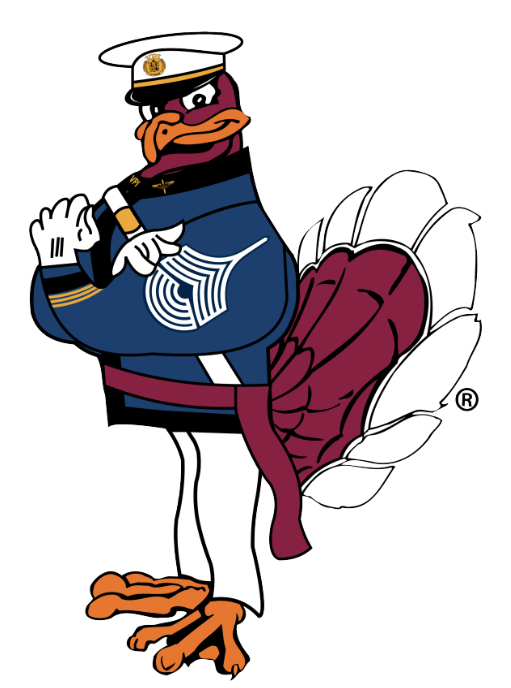Leader Development Program

Guided by the university motto of Ut Prosim (That I May Serve), the Virginia Tech Corps of Cadets is a four-year leader development program designed to graduate leaders of exemplary character who are instilled with the values and skills essential for leadership success in service to the nation.
The Corps achieves this by being a distinctly organized group of students who adhere to a strict code of honor, wear a distinctive cadet uniform, live in designated cadet barracks, and train to military-inspired standards. Cadets live in a diverse joint, military-style environment that provides opportunities to lead and follow at all levels of the organization.
The Leader Development Program is designed as a bridge between the VTCC Strategic Plan (strategic) and Cadet Regulations (tactical). It serves to translate the vision into expectations on performance, training, and education of cadets throughout their four years in the Corps to achieve the goal of graduating leaders of exemplary character.
Descriptive rather than prescriptive, the Leader Development Program paints a picture of the cadet experience from arrival during New Cadet Week, through each class year to graduation and beyond. It also provides fidelity to the activities of cadets and the commandant’s staff called out in the VTCC Strategic Plan.
Four-year Progression
The Leader Development Program of the Corps of Cadets is a four-year, progressive program based upon a servant-leader model whose foundation is selflessness steeped in respect for others. Each class year in the Corps focuses on an element of leadership that builds toward graduating global ethical leaders of character:
First-Year: Leading self in preparation of becoming a fire team leader
Sophomore: Leading people in preparation of becoming a cadet non-commissioned officer
Junior: Leading organizations in preparation of becoming a cadet officer
Senior: Leading in preparation of becoming a future junior officer or civilian leader
Each year is further divided into semesters that build on the experience of the preceding semester using a learn-experience progression, with the fall focused on learning skills that will be put into practice and reflected upon in the spring semester.



Leader Development Program Goals
The goal of the LDP is to graduate leaders of exemplary character who are instilled with the values and skills essential for leadership success in service to the nation.
This is achieved by:
- Instilling Foundational Values
- Developing and Refining Leadership Skills
- Inspiring a Sense of Service
- Molding Character through Experience
Leadership is both a science and an art. Leadership can be studied and learned, but must also be practiced in order to fully comprehend and embrace its power and potential for good.

Cadets are challenged and encouraged by practical application and frequent evaluation in positions of ever-increasing responsibility within a diverse, joint, military-style leadership environment.
The program begins with developing active followership skills and learning to lead one’s self in our incoming first-year cadets. Elements include learning basic military skills and standards, developing self-understanding, college success strategies, and an introduction to studying leadership. At the end of their first year in the Corps of Cadets, cadets are prepared to step into the role of fire team leader.
Sophomores are expected to assume the role of frontline leaders and begin leading others. With the focus on small unit leadership, essential skills developed during this period include mentorship, one-on-one and one-on-few training, development of subordinates, and an introduction to the conduct of counseling and evaluation of subordinates. There is a continued focus on team building as a class as they are incorporated into new units. At the end of their sophomore year, cadets are prepared to step into the roles of cadet non-commissioned officers at the company, battalion, or regimental level.
The focus for juniors is on organizational leadership. During this year, cadets are fully engaged in the day-to-day operations of the Corps and see to the functioning of their organizations as well as overseeing the growth and development of the first-year cadets. Juniors as also expected to mentor and take an active role in counseling and evaluating their subordinates. At the end of their junior year, cadets are prepared to step into the roles of cadet officers including command at all levels of the regiment and critical staff officer roles at the battalion or regimental levels.
Seniors, serving across the regiment as cadet officers, are at a transition point in their leader development with their focus at the strategic level with an eye toward building the organization for the future. First, they see to the strategic direction of their organizations to include setting specific goals that inform the actions of all other members of the Corps. Seniors are also expected to step out of the direct training role and into a supervisory and assessment role in the Corps’ training activities. They are also at the stage where they are preparing to transition to their post-Corps professions and thus should be putting the final touches on their own personal and professional development.
For this Leader Development Program to be successful, the Corps must be run by the cadets. The commandant’s staff seeks to empower cadet leaders at all levels with the freedom to act within the parameters outlined in the Cadet Regulations. Serving as advisors and mentors, the staff helps those leaders set the organization's vision; plan, execute, and assess training; refine and implement cadet-driven goals; plan, implement, execute, and assess Corps activities; and provide cadets the space to make and learn from mistakes made in that process. With a bias toward action, the staff encourages each class of cadets to own their leadership of the organization by setting an environment for success across the Corps.

For more information, please refer to these links


